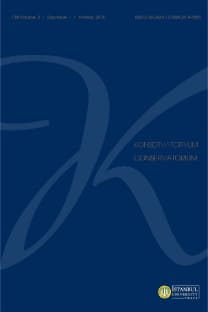Uygulamalı Tiyatro ile Yeni Bir Toplum Hayali
Bu makale, uygulamalı tiyatroyu tanımı, kapsamı ve toplumsal değişim yaratma potansiyeli bakımından anlamak, tartışmak ve bu bağlamda öneriler ortaya koymayı amaçlamaktadır. Uygulamalı tiyatro, toplumsal değişimi kolaylaştırmak için yapılan tüm tiyatro ve drama türlerini kapsayan bir şemsiye tanımdır. Seçilmiş hedef grup veya topluluklarla uygulanan, ve katılımcıların beklenen değişim ve iyileşmeyi göstermesinin umulduğu bir tiyatro uygulamaları bütünüdür. Uygulamalı tiyatronun Türkiye’de örnekleri maalesef kısıtlıdır fakat Amerika, Hong Kong, İngiltere hatta Uganda gibi ülkelerde oldukça önemli örnekleri mevcuttur. Toplumsal koşulları her zaman karakteristik özellikler taşıyan ülkemizde, özellikle bu yüzyılda büyük sosyal, kimliksel ve sınıfsal yarılmalar oluşmuştur. Devlet politikalarının yetersiz ya da çaresiz kaldığı durumlarda, belli gruplarla başlayarak toplulukların uygulamalı tiyatro yardımıyla yeni bir toplum hayalinin taşıyıcıları olup olmayacağını tartışmak, geleceğe dair umudu kuvvetlendirecektir. Bu bağlamda çalışma, uygulamalı tiyatronun bu umudu gerçeğe dönüştürecek nesnel sonuçları olup olmayacağını ortaya koymaktadır.
Anahtar Kelimeler:
Uygulamalı Tiyatro, Toplum, Değişim
Imagining a New Society Through Applied Theatre
This article aims to understand and discuss applied theater in terms of its definition, scope, and potential for creating social change, and to present suggestions in this context. Essentially, applied theater is a theater practice that is applied to selected target groups or communities, and with participants are being expected to exhibit the expected change and improvement. Unfortunately, examples of applied theater in Türkiye are limited, but significant examples are found in countries such as America, Hong Kong, England, and even Uganda. Türkiye has always had characteristic social conditions, particularly in this century, and significant social, identity, and class divisions have emerged here. Discussing whether communities can be the carriers of a new society through applied theater, by starting with specific groups in the face of inadequate or non-beneficial state policies will strengthen hope for the future. In this context, this study reveals whether applied theater provides objective results that can turn this hope into reality.
Keywords:
Applied Theatre, Society, Change,
___
- Ackroyd, J. (2007). Applied theatre: an exclusionary discourse? In Applied Theatre Researcher. google scholar
- Aygan, T. (2022) Finding hope and healing through theatre in Turkish prisons: an interview with Turgay Tanülkü, google scholar
- Research in Drama Education: The Journal of Applied Theatre and Performance, https://doi.org/10.1080/1356 9783.2022.2122790 google scholar
- Balfour, M. (2009). The politics of intention: looking for a theatre of little changes. Research In Drama Education: The Journal of Applied Theatre and Performance, 14(3), 347-359. google scholar
- Belifore, E., ve Bennett, O. (2008). The social impact of the arts: an intellectual history. Basingstoke: Palgrave Macmillan. Cohen-Cruz, J. (2010). Engaging performance: theatre as cali and response. New York: Routledge. google scholar
- Freebody, K., Finneran, M., Balfour, M. ve Anderson, M. (2018). Applied theatre: understanding change. Switzer-land: Springer. google scholar
- Ford, Antoinette. Reminiscence theatre.” https://howlround.com/reminiscence-theatre, Erişim Tarihi 12 Nisan 2023. Freebody, K. (2015). Navigating (the terminology of) success and intent in drama for social justice. In S. Schonmann (Ed.), Internationalyearbook for research in arts education (pp. 252-256). Münster: Waxmann. google scholar
- Funiciello, T. (1990). The poverty of industry. Ms. (November/December), 32-40. google scholar
- Hughes, C., Jackson, A. ve Kidd, J. (2007). The role of theatre in museums and historic sites: visitors, audiences, and learners. In. L. Braser (Ed), International handbook of research in arts education (ss. 679-696). Dordrecht, The Netherlands: Springer. google scholar
- Jackson, T. (2007). Theatre, education and the making of meanings. Manchester: University of Manchester Press. google scholar
- Landy, Robert J., and David T. Montgomery (2012). Theatre for change: education, social action and therapy. Palgrave Macmillan. google scholar
- Neelands, Jonathan (2004). Miracles are happening: beyond the rhetoric of transformation in the western traditions of drama education. Research in Drama Education 9(1), 47-56. google scholar
- Nicholson, Helen (2005). Applied drama: the gift of theatre. Basingstoke Palgrave Macmillan. google scholar
- Osbourne, T. (1997). On health and statecraft. In A. Petersen ve R. Bunton (Eds.), Foucault, health and medicine (pp. 173-188). London: Routledge. google scholar
- Österlind, Eva. (2008). Acting out of habits - can theatre of the oppressed pro- mote change? Boal’s theatre metho-ds in relation to Bourdieu’s concept of habitus. Research in Drama Education 13(1), 71-82. google scholar
- Prendergast, M., Saxton J. (Ed) (2009). Applied theatre: International case studies and challenges for practice. UK/ USA: Intellect. google scholar
- Snyder-Young, Dani (2013). Theatre of good intentions challenges and hopes for theatre and social change, New York: Palgrave MacMillan. google scholar
- Stone Hanley, M. (2013). Introduction: Culturally relevant arts education for social justice. In M. Stone Hanley, G. Sheppard, G. Noblit, ve T. Barone (Eds.), Culturally relevant arts educa- tion for social justice: a way out of no way (pp. 1-12). London: Routledge. google scholar
- Sociology Guide (2023, 20 Nisan). Erişim Adresi: https://www.sociologyguide.com/basic-concepts/societ-y-and-community.php google scholar
- Taylor, P. (2006). Applied theatre/drama: An e-debate in 2004: Viewpoints. RIDE: Research in Drama and Educa-tion, 11(1), 90-95. google scholar
- Thompson, J. (2012). Applied theatre: bewilderment and beyond. Oxford: Peter Lang. google scholar
- Thomson, J. (2003). Applied theatre: bewilderment and beyond. New York, NY: Peter Lang. google scholar
- Zull, J. (2002). The art of changing the brain: enriching the practice of teaching by exploring the biology of lear-ning. Sterling, VA: Stylus google scholar
- ISSN: 2146-264X
- Yayın Aralığı: Yılda 2 Sayı
- Başlangıç: 2011
- Yayıncı: İstanbul Üniversitesi Devlet Konservatuvarı
Sayıdaki Diğer Makaleler
Saygun’s Perspective on Tradition and the Anatolian Melodies Used in the Opera Kerem
Songs About The Đurumlije in Music Education
Bir Postmodernizm Tartışması: György Ligeti’nin Le Grand Macabre Operası
Duygu KÜÇÜK ÖZBEK, Şebnem ÜNAL
Uygulamalı Tiyatro ile Yeni Bir Toplum Hayali
Piyanoda Hız Gerektiren Pasajların Farklı Ritim Kalıpları İle Çalışılmasının İncelenmesi
Plautus’un Amphitryon Oyununun Broadway ve Türkiye’deki Müzikal Uyarlamaları
İkinci Dünya Savaşı’nın Sovyet Klasik Müziği’ne Etkileri
